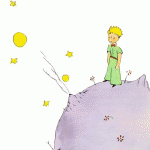 The Little Prince by Antoine De Saint-Exupéry is the first “grown-up” book I ever read. Which is ironic because it’s a children’s book about how we should never lose our sense of child-like wonder. Actually, the book is about a million different things and about absolutely nothing. While much of the mythology went over my head when I’d originally read the book as a kid, the story’s rich symbolism and metaphor made that fact pretty apparent. Even back then, I knew there was a lot going on in the book that I didn’t understand. I actually read the book again a few years ago after reading The Alchemist by Paulo Coelho because the story reminded me of it. I think I understand it a little better now, but will probably have to read it again in another 30 years or so. Something tells me that when I read it a final time as an old man, I will realize that I understood it the clearest when I was a kid. And that’s sort of the point.
The Little Prince by Antoine De Saint-Exupéry is the first “grown-up” book I ever read. Which is ironic because it’s a children’s book about how we should never lose our sense of child-like wonder. Actually, the book is about a million different things and about absolutely nothing. While much of the mythology went over my head when I’d originally read the book as a kid, the story’s rich symbolism and metaphor made that fact pretty apparent. Even back then, I knew there was a lot going on in the book that I didn’t understand. I actually read the book again a few years ago after reading The Alchemist by Paulo Coelho because the story reminded me of it. I think I understand it a little better now, but will probably have to read it again in another 30 years or so. Something tells me that when I read it a final time as an old man, I will realize that I understood it the clearest when I was a kid. And that’s sort of the point.
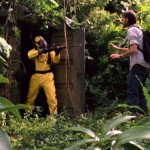 There seems to be a pattern that determines when Locke and the gang are jumping in time on Lost. Whether it’s Richard Alpert telling Locke what to do when he next sees him, or Faraday telling Desmond to find his mother in the future, or Locke telling Alpert to seek him out in a few years once he’s born. So far, the jumps occur whenever a character is talking to another character about events from a different time. Perhaps fate is preventing the characters from knowing something they shouldn’t be privy too or maybe it’s time’s way of course correcting, but I believe there is a deeper reason why the time jumps are happening at that exact moment. And it relates to wisdom we can use in our real lives.
There seems to be a pattern that determines when Locke and the gang are jumping in time on Lost. Whether it’s Richard Alpert telling Locke what to do when he next sees him, or Faraday telling Desmond to find his mother in the future, or Locke telling Alpert to seek him out in a few years once he’s born. So far, the jumps occur whenever a character is talking to another character about events from a different time. Perhaps fate is preventing the characters from knowing something they shouldn’t be privy too or maybe it’s time’s way of course correcting, but I believe there is a deeper reason why the time jumps are happening at that exact moment. And it relates to wisdom we can use in our real lives.
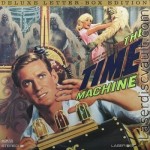
Right from the start of Lost’s fifth season premiere, “Because You Left,” we learn that the island is officially capable of moving through time and space. Time travel has been a theme of Lost since at least Desmond’s mind-flashes during season three, and perhaps as far back as the “Adam and Eve” skeletons of season one. Now however, it has been unequivocally confirmed as a very real, functioning principle within the show’s mythology. Or, has it?
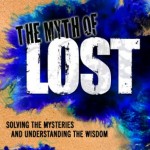
We all know that Lost is filled with lots of hidden clues—everything from the books the characters read and the philosophers their names are based on, to the anagrams, whispers, and backwards-talk found in many episodes. While these hints can help us to understand the show, there is something else woven into its many mysteries that is far more valuable to our everyday lives…
 Hello fellow fans of the mysterious universe!
Hello fellow fans of the mysterious universe!
So much has happened since my last Layman*/Lost** update, I don’t know where to begin. I guess that’s because for the first time since I began these updates back in January 2006, I now actually have a published book I can talk about! In typical Lost fashion however, let’s take a flashback first…
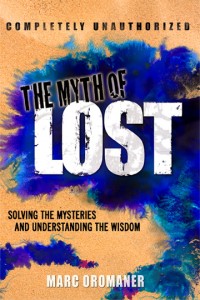 Greetings to you—my loyal Layman/Lost Update readers!
Greetings to you—my loyal Layman/Lost Update readers!
After two years of talking about it, THE MYTH OF LOST is finally here!!! At last, you can read the book that offers a fascinating solution to the mysterious television series and reveals how the show contains startling hidden insights into the mysteries of life!
That’s right, THE MYTH OF LOST: Solving the Mysteries and Understanding the Wisdom is now available at Amazon.com in soft and hardcover versions!
Click here to check it out!
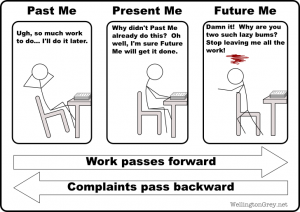 As those of you who had read my last update in March remember, in honor of Desmond’s time traveling abilities, I conversed with both my past and future selves. My future self back then is now my current self. So, let’s see how I did and why I may have fabricated certain answers to my (now) past self.
As those of you who had read my last update in March remember, in honor of Desmond’s time traveling abilities, I conversed with both my past and future selves. My future self back then is now my current self. So, let’s see how I did and why I may have fabricated certain answers to my (now) past self.
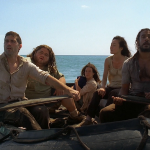 Continuing in the same vein as Part 1, Parts 2&3 was mostly action/adventure and little mythology. And what little there was still seems to support my theory.
Continuing in the same vein as Part 1, Parts 2&3 was mostly action/adventure and little mythology. And what little there was still seems to support my theory.
For starters, at the end of the last episode’s update, I wrote:
In “Something Nice Back Home” Hurley even suggests that none of them made it off the island, and they were, perhaps dead. Not dead, just stuck in limbo between worlds. I feel like the season will end with the five of them not being rescued as we think, but getting hurt, and this whole flash-forward has all been in their minds.
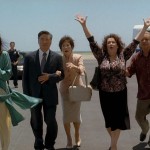 Since the purpose of these season finales is primarily to finally link together the flash-forwards with the story on the island, there’s very little mythology involved. While gripping and fast-paced, it’s really all soap opera stuff. For that reason, there really isn’t much to say about them from a mythological perspective. Except perhaps, that they seem to give further weight to the island having been real and not a simulation after all.
Since the purpose of these season finales is primarily to finally link together the flash-forwards with the story on the island, there’s very little mythology involved. While gripping and fast-paced, it’s really all soap opera stuff. For that reason, there really isn’t much to say about them from a mythological perspective. Except perhaps, that they seem to give further weight to the island having been real and not a simulation after all.
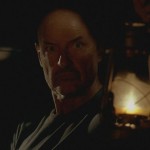 You can always be sure that the Locke-centric episodes will focus more on mythology than action and this episode didn’t disappoint. Between Locke’s creepy dream of Horace Goodspeed, his exploration of Jacob’s cabin, his conversation with Christian Shephard and an eerily entranced Claire, and the flashback scenes hinting at his strange childhood with appearances by an unchanged Richard Alpert, there were more than enough mysteries to keep fans occupied.
You can always be sure that the Locke-centric episodes will focus more on mythology than action and this episode didn’t disappoint. Between Locke’s creepy dream of Horace Goodspeed, his exploration of Jacob’s cabin, his conversation with Christian Shephard and an eerily entranced Claire, and the flashback scenes hinting at his strange childhood with appearances by an unchanged Richard Alpert, there were more than enough mysteries to keep fans occupied.
 The Little Prince by Antoine De Saint-Exupéry is the first “grown-up” book I ever read. Which is ironic because it’s a children’s book about how we should never lose our sense of child-like wonder. Actually, the book is about a million different things and about absolutely nothing. While much of the mythology went over my head when I’d originally read the book as a kid, the story’s rich symbolism and metaphor made that fact pretty apparent. Even back then, I knew there was a lot going on in the book that I didn’t understand. I actually read the book again a few years ago after reading The Alchemist by Paulo Coelho because the story reminded me of it. I think I understand it a little better now, but will probably have to read it again in another 30 years or so. Something tells me that when I read it a final time as an old man, I will realize that I understood it the clearest when I was a kid. And that’s sort of the point.
The Little Prince by Antoine De Saint-Exupéry is the first “grown-up” book I ever read. Which is ironic because it’s a children’s book about how we should never lose our sense of child-like wonder. Actually, the book is about a million different things and about absolutely nothing. While much of the mythology went over my head when I’d originally read the book as a kid, the story’s rich symbolism and metaphor made that fact pretty apparent. Even back then, I knew there was a lot going on in the book that I didn’t understand. I actually read the book again a few years ago after reading The Alchemist by Paulo Coelho because the story reminded me of it. I think I understand it a little better now, but will probably have to read it again in another 30 years or so. Something tells me that when I read it a final time as an old man, I will realize that I understood it the clearest when I was a kid. And that’s sort of the point. There seems to be a pattern that determines when Locke and the gang are jumping in time on Lost. Whether it’s Richard Alpert telling Locke what to do when he next sees him, or Faraday telling Desmond to find his mother in the future, or Locke telling Alpert to seek him out in a few years once he’s born. So far, the jumps occur whenever a character is talking to another character about events from a different time. Perhaps fate is preventing the characters from knowing something they shouldn’t be privy too or maybe it’s time’s way of course correcting, but I believe there is a deeper reason why the time jumps are happening at that exact moment. And it relates to wisdom we can use in our real lives.
There seems to be a pattern that determines when Locke and the gang are jumping in time on Lost. Whether it’s Richard Alpert telling Locke what to do when he next sees him, or Faraday telling Desmond to find his mother in the future, or Locke telling Alpert to seek him out in a few years once he’s born. So far, the jumps occur whenever a character is talking to another character about events from a different time. Perhaps fate is preventing the characters from knowing something they shouldn’t be privy too or maybe it’s time’s way of course correcting, but I believe there is a deeper reason why the time jumps are happening at that exact moment. And it relates to wisdom we can use in our real lives.








